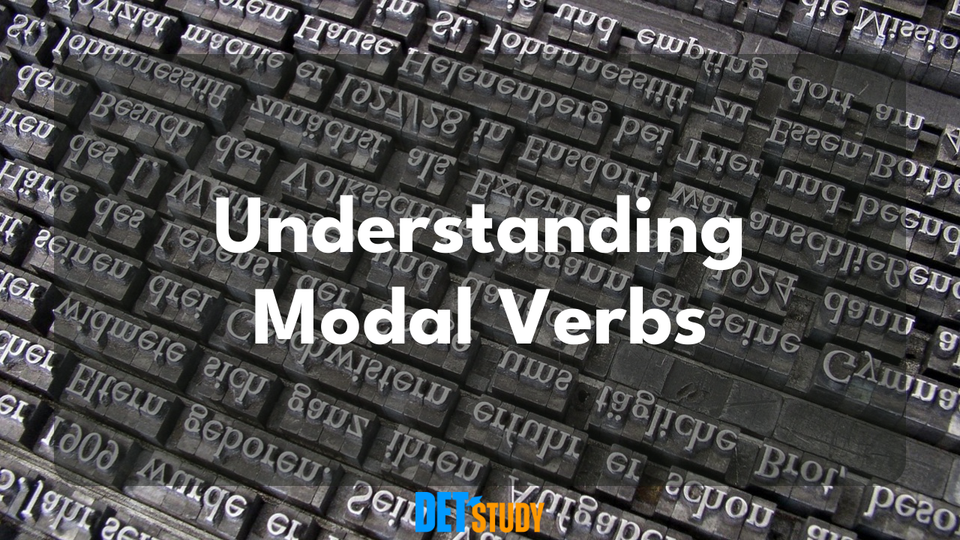Must, May, Might: Understanding Modal Verbs for Enhanced English Proficiency

Introduction to Modal Verbs: Must, May, and Might
Modal verbs are essential in English as they help convey different shades of meaning, such as necessity, possibility, or permission. In this section, we'll focus on three commonly used modal verbs: must, may, and might.
5 Tips for the Read Then Speak Question: Duolingo English TestMust
The modal verb "must" is primarily used to express necessity or obligation. When you use "must," it indicates something is essential or required. It's also employed to show strong recommendations or deduce certainty.
Examples:
- You must wear a helmet when riding a bike. (obligation)
- Participants must register by Friday to attend the workshop. (necessity)
- She must be at home; her car is parked outside. (deduction or certainty)
May
"May" is a versatile modal verb often used to express permission, possibility, or a polite suggestion. It's more formal than "can" when asking for permission.
Examples:
- You may leave the table when you are finished eating. (permission)
- It may rain this afternoon, so take an umbrella just in case. (possibility)
- May I offer you some assistance? (polite suggestion)
Might
"Might" is used to indicate a lower possibility than "may." It's often suitable when discussing hypothetical situations or speculating about something uncertain.
Examples:
- She might come to the party, but she'll let us know later. (possibility)
- If you took that route, you might reach there quicker. (hypothetical situation)
- He might have forgotten his wallet at home. (speculation)
Comparison between May and Might
Although "may" and "might" are frequently interchangeable, using "might" often implies a lesser degree of certainty than "may." When you want to sound more tentative or when the outcome is more uncertain, "might" is the preferred choice.
Examples:
- May: It may snow tomorrow. (a definite possibility)
- Might: It might snow tomorrow, but it's unlikely. (a lesser possibility)
Understanding these distinctions helps English learners use these modal verbs more accurately and effectively in different contexts. By practicing with examples and observing their usage in real-life situations, learners can enhance their command of these essential verbs.
Differences Between Must, May, and Might
Understanding the differences between "must," "may," and "might" is crucial for conveying the right meaning in English. Here's how these modal verbs differ:
Must
"Must" signifies strong necessity or obligation. It conveys a sense of requirement or compulsion. Additionally, "must" can express a strong logical conclusion or certainty about a situation.
Examples:
- You must complete the assignment by Monday. (obligation)
- This is a dangerous area, you must be careful. (necessity)
- He must be the manager because he's giving instructions to everyone. (certainty)
May
"May" allows for the expression of permission, possibility, or polite requests. It suggests a level of formality and is used to express a moderate degree of certainty.
Examples:
- May I use your pen? (permission)
- There may be delays due to traffic. (possibility)
- You may take the day off if you feel unwell. (permission, possibility)
Might
"Might" expresses a lower degree of certainty than "may" and is often used for speculation or describing hypothetical scenarios. It implies that an event is possible but not guaranteed.
Examples:
- She might call you later if she has time. (possibility)
- If we leave now, we might catch the earlier train. (hypothetical scenario)
- He might have already left for the day. (speculation)
Key Differences
1. Level of Certainty: - Must implies certainty or strong obligation (e.g., "You must submit the report."). - May indicates moderate possibility or permission (e.g., "We may go to the park if it doesn't rain."). - Might suggests a lower possibility or is used for speculative scenarios (e.g., "It might be true, but we need more evidence.").
2. Formality and Usage: - Must is forceful and conclusive, suitable for rules or logical deductions. - May is used for formal permission or possibilities. - Might softens the certainty, fitting for tentative or hypothetical contexts.
Through examples and context, English learners can become more adept at choosing the correct modal verb. Understanding these subtleties enhances both written and spoken language skills.
When to Use "Must" for Necessity and Certainty
"Must" is a powerful modal verb in English, used to express both necessity and certainty. Recognizing when to use "must" can enhance the clarity and assertiveness of your statements.
Expressing Necessity
When "must" is employed to indicate necessity, it suggests that there is no other option but to follow the requirement. It denotes a strong obligation, often imposed by rules, laws, or duties.
Examples:
- You must wear a helmet while riding a motorcycle. (requirement by law)
- Students must submit their homework by Friday. (teacher's requirement)
- All employees must attend the meeting at 10 AM. (workplace obligation)
In these examples, "must" implies a non-negotiable condition that needs to be fulfilled.
Expressing Certainty
Apart from indicating necessity, "must" is also used to express strong certainty about a conclusion based on available evidence or logical reasoning. It shows that you are almost sure about something.
Examples:
- She must be at home — I saw her car in the driveway. (logical deduction based on evidence)
- You worked overtime every day; you must be exhausted. (logical conclusion)
- If the lights are off, they must have left the house. (strong certainty based on observation)
In such cases, "must" reflects the speaker's confidence in their conclusion.

Comparing Necessity and Certainty
It's important to understand the context to determine whether "must" is being used for necessity or certainty:
- Necessity: "You must fasten your seatbelt." (obligatory action)
- Certainty: "The light is on; someone must be in the room." (logical inference)
Both uses of "must"—necessity and certainty—derive their power from the speaker's conviction, whether that conviction is about an imposed rule or an inferred truth. While necessity relates to external obligations, certainty deals with internal conviction, often backed by circumstantial evidence.
These distinctions underscore the practical uses of "must" in English, making it an essential part of expressing authority, rules, and logical conclusions effectively. Understanding these applications can help English language learners communicate with greater precision and clarity.
Using "May" for Possibility and Permission
"May" is a versatile modal verb that English learners can use to indicate both possibility and permission. Understanding how to use "may" correctly will help in forming polite requests and discussing potential scenarios.
Indicating Possibility
When "may" is used to express possibility, it suggests a chance or likelihood that something might happen. "May" sits between "must" and "might" in terms of certainty, indicating a moderate level of possibility.
Examples:
- We may see rain later this afternoon. (moderate possibility)
- She may pass the exam if she studies hard. (there's a chance she will pass)
- There may be traffic on the way to the airport. (a likely scenario)
In these examples, "may" is used to indicate that there is a real possibility, influenced by current circumstances or known factors.
Granting Permission
"May" is commonly used in formal contexts to give or seek permission. It is more polite and traditional compared to using "can," which is more informal.
Examples:
- You may start your exam now. (granting permission)
- May I use your phone for a moment? (asking for permission politely)
- Students may leave the class once they finish the test. (formal allowance)
Such usage of "may" makes the interaction sound respectful and courteous, especially in formal or official settings.
How to Boost Your Duolingo English Test Score by 10 PointsCombining Possibility and Permission
Sometimes, "may" can be employed in ways that blur the lines between possibility and permission, especially when a scenario could naturally evolve into a permissible action.
Examples:
- You may go home early if you finish your work. (a conditional permission based on possibility)
- Visitors may enter the gallery after 10 AM. (allowed, indicating an open possibility)
In these scenarios, the outcome depends on certain conditions being met, illustrating both a potential occurrence and a permission grant.
Choosing Between "May" and "Can"
While "may" is more formal, "can" is used frequently in casual conversations. As such, learners should consider the context when choosing which to use:
- May I leave the table? (formal)
- Can I leave the table? (informal)
By mastering "may," learners can articulate conditions and permissions with a degree of finesse that reflects both mannerliness and awareness of context. Through consistent practice, using "may" for these purposes can become second nature.
Understanding "Might" for Hypothetical and Less Certain Situations
"Might" is another important modal verb used in English to express situations that are hypothetical or deemed less certain. When you use "might," you are indicating a lower degree of certainty than "may" or "must." This is useful for expressing doubt, suggestion, or a tentative possibility.
Indicating Hypothetical Situations
"Might" is often used to discuss hypothetical or imagined scenarios. It suggests that something could happen, but there is no strong evidence to support it.
Examples:
- He might travel to Japan next summer. (it's an idea, but not certain)
- If I win the lottery, I might buy a new car. (an imagined scenario with an uncertain outcome)
- She might have taken the wrong train. (a guess about a past event)
In these examples, "might" presents an outcome as one of many possibilities, leaving room for alternative conclusions.
Test Your EnglishExpressing Less Certainty
When you are not sure about something, "might" helps convey doubt or reservation.
Examples:
- It might rain later. (not sure, lacking strong evidence)
- They might not come to the party. (uncertainty about attendance)
- This might be the right way, but I'm not certain. (expresses doubt about direction)
These sentences show how "might" communicates a lower certainty, allowing space for doubt or flexibility in prediction.
Making Suggestions or Proposals
"Might" can also be used to gently offer suggestions or make proposals, especially when you want to be less direct.
Examples:
- You might want to check the weather before heading out. (suggestion with a hint of advice)
- We might consider trying this new restaurant. (a tentative proposal)
- You might need a jacket for the evening. (a subtle recommendation)
Using "might" in this way softens the suggestion, making it less forceful and more conversational.
Comparing "Might" with "May"
Though "might" and "may" can sometimes be interchangeable, using "might" often implies a greater degree of uncertainty. In more formal contexts or when discussing a slightly more probable scenario, "may" might be preferred.
Examples:
- She might attend the meeting. (less certain)
- She may attend the meeting. (more certain)
Understanding the subtleties between "might" and "may" helps create nuanced expressions in English, enhancing your ability to communicate with precision and sensitivity to the context.
DET Study provides an extensive suite of over 15,000 practice questions, focusing on leveraging adjectives and adverbs to fortify your grammatical skills. Regular practice with these targeted materials ensures that you approach the Duolingo English Test with enhanced confidence and precision, ready to achieve your desired scores.
🎯 Need more practice? Check out DETStudy.com for expert resources, 15,000+ practice questions, and AI-powered writing and speaking feedback.
Frequently Asked Questions (FAQ)
When should I use "must" in a sentence?
How do "may" and "might" differ in usage?
Can "must" be used for permission like "may"?

